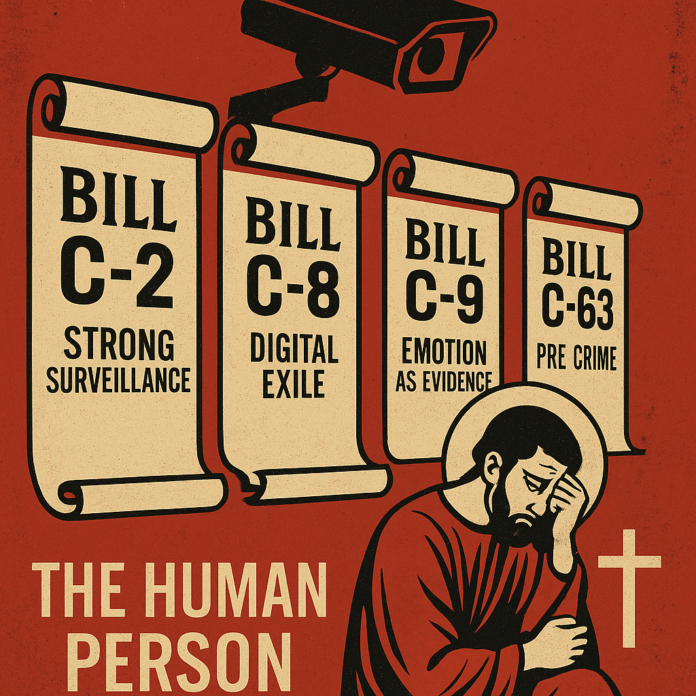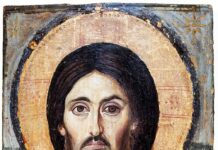Over the past decade, Canada has slid from policing words to policing thoughts. What was once the domain of dystopian fiction, such as Minority Report (based on the 1956 short story The Minority Report by Philip K. Dick), and Orwell’s 1984, is quickly becoming legislative reality. In Parliament, laws keep piling up, each one nibbling at liberty’s edges.
From the standpoint of Catholic Social Teaching (CST), these legislative shifts reflect a loss of moral orientation. The Compendium of the Social Doctrine of the Church (Compendium §§160–161) teaches that every social system must be grounded in the dignity of the human person and oriented toward the common good (Catechism §§1902–1903). When governments place efficiency or security above truth and human dignity, they invert the moral hierarchy that sustains a just society. As Pope Leo XIII (Libertas Praestantissimum §23) warned, freedom unmoored from truth inevitably degenerates into moral chaos.
Too many in Ottawa forget that Orwell’s 1984 was intended as a warning, not a guidebook. Luckily, Civil-society groups have sounded the alarm. Activist site CitizenGO calls the plan a “muzzle-and-monitor” bill—legislation that would tie up both speech and privacy and turn democratic tools against the public itself.
On June 3, 2025, the Carney government tabled Bill C-2, the so-called “Strong Borders Act,” a sweeping surveillance proposal marketed as a crackdown on fentanyl, money-laundering, and auto theft. Over the summer, critics warned that the bill’s “lawful-access” provisions would allow bureaucrats and judges to watch, silence, and even punish Canadians before they acted. Then, on October 8, 2025, constitutional lawyer John Carpay, president of the Justice Centre for Constitutional Freedoms, issued a stark warning that if Parliament passed these measures, “Canada would be a police state by Christmas.”
That same day, under mounting civic pressure and parliamentary opposition, the government withdrew Bill C-2 and re-tabled a trimmed version as Bill C-12. Though narrower in scope, it still expanded data grabs, permitted warrant-free mail searches, and encouraged information-sharing between departments. Different name, same mindset.
Every one of these measures comes wrapped in the soothing words “safety” and “security.” Together they outline a slow, bureaucratic march toward a managed state. None of this happened overnight. In earlier essays such as “Canada’s Boldest Professor Defies the Gender Police” (2016), “Canada’s Free Speech Wars (2017), “The Tyranny of Gender Ideology in Practice” (2023), and “A Catholic’s Caution About Carney” (2025), I tracked how successive governments, first Trudeau’s and now Carney’s, turned compassion into compliance and rebranded dissent as hate. Like a frog in slowly heating water, Canadians keep adjusting until it’s too late to jump.
Bill C-2 / C-12: From “Strong Borders” to Strong Surveillance
Under mounting backlash from more than 300 civil-society groups including Awake Canada (Civil Rights Association) and from opposition parties across the spectrum, Public Safety Minister Dominic LeBlanc withdrew the surveillance clauses on early October 8, 2025. After its withdrawal, Bill C-2 quickly re-emerged in slimmer form as Bill C-12. The rebranding did little to change its essence: both bills reflected the same impulse to expand state oversight under the banner of security. What changed was presentation, not principle. The government offered assurances of restraint, but the architecture of surveillance remained intact. The retreat was a victory for civic engagement and parliamentary vigilance, but also a warning of how easily “public safety” can be used to mask systemic power grabs.
However, even in its revised form, Bill C-2/C-12 stands as a cautionary tale: security invoked as virtue to justify surveillance as policy. It showed how close Canada came to codifying mass data collection and how fragile our freedoms remain when citizens stop watching the watchers.
The bill’s overreach was unmistakable. It relied on a “reasonable grounds to suspect” threshold, far weaker than the traditional “reasonable grounds to believe” standard, allowing police and intelligence agencies to seize subscriber and metadata information without warrants. Privacy experts such as Michael Geist and Commissioner Philippe Dufresne warned that this regime revived failed surveillance proposals from earlier Liberal initiatives and directly contradicted Supreme Court rulings in R. v. Spencer (2014) and R. v. Bykovets (2024), both of which affirmed constitutional protection for digital subscriber data.
Among its most troubling clauses, 487.0121 and 487.0142, law enforcement could issue or obtain one-sided orders compelling any “electronic service provider” from ISPs to social-media platforms, prayer apps, dating apps, or even non-digital businesses to disclose user details and metadata without notice or judicial approval. Providers can be given as little as five days to comply. Critics warned these measures would enable mass “fishing expeditions” into Canadians’ online behaviour, revealing political, religious, and personal affiliations under the thinnest suspicion of “wrongdoing.”
Other sections would have mandated “backdoors” in communication systems, imposed costly compliance duties on small providers, and authorized Canada Post to open private letters or packages on vague grounds of border enforcement. Together, these powers formed what constitutional lawyer John Carpay called “a massive invasion of privacy.”
From the perspective of Catholic social doctrine, such centralization of surveillance power directly contradicts the principle of subsidiarity (Compendium §§185–188), which holds that higher authorities must support, not replace, the proper functions of individuals and local communities. As St. Pope John Paul II observed in Centesimus Annus (Centesimus Annus §46), freedom can only flourish when it is exercised in truth and ordered toward the authentic good of the person and society.
Even stripped down, the impulse behind it didn’t die. It re-emerged almost immediately in Bill C-8, a new Cyber Security Act that extends digital monitoring into nearly every corner of Canadian life.
Bill C-8: The Cyber Security Act: Digital Exile by Decree
Bill C-8 grants cabinet ministers power to order Internet providers to block individuals, demand subscriber data, and levy fines up to $50,000 per day on citizens or $15 million on corporations—with no compensation for losses. Appeals, Carpay notes, would require “$100,000 in the bank.”
This creates a digital exile whereby a Canadian can be disconnected from communication, banking, and employment at a minister’s whim. Cyber-security is the façade; centralized control is the objective. Totalitarianism rarely kicks in the front door, it creeps quietly at the back, disguised as administrative efficiency and public safety.
The Church’s principle of solidarity (Compendium §§193–196) stands in sharp opposition to such policies of isolation. As St. John Paul II taught in Sollicitudo Rei Socialis (Sollicitudo Rei Socialis §38), solidarity is not mere sentiment but “a firm and persevering determination to commit oneself to the common good.” Digital exile, imposed by administrative fiat, destroys this communal fabric. Pope Francis (Laudato Si’ §107), too, warns that when technocracy becomes detached from ethics, human beings are reduced to data rather than seen as persons made in the image of God.
China perfected a digital firewall to silence dissent; Canada’s Bill C-8 risks importing a softer version of the same system. The legislation would let cabinet ministers cut citizens off from the Internet, phones, or even banking, all without a judge’s order or public explanation. Such unchecked power would move Canada one step closer to a Western-style social-credit regime where access to communication becomes conditional on obedience.
No judge. No warrant. No explanation. With a single directive from Ottawa, a citizen could vanish from the digital world: phone, internet, and even banking, as if erased by decree. And to make matters worse, speaking publicly about such an order could bring a $25,000 fine, a price placed on the very act of telling the truth.
Thus, those subjected to such digital erasure would have no avenue for appeal or public defense, no means to contest the accusation or even to speak of it. This enforced silence violates the very principle of the human person as a being made for truth and communication, what the Church calls participation in the divine Logos. To forbid a citizen to speak in his own defense is to deny the image of God that speaks within him.
Bill C-9: The Combating Hate Act: Emotion as Evidence
Bill C-9 abolishes the requirement that the Attorney General approve hate-speech prosecutions and allows judges to lengthen sentences whenever they feel that hate was a motive. This shift replaces legal objectivity with emotional discretion, lowering the evidentiary bar for criminal liability.
Nevertheless, Canada already possesses clear and enforceable hate-speech provisions. Under section 319 of the Criminal Code, “public incitement of hatred” and “wilful promotion of hatred” are indictable offences punishable by up to two years in prison. The Code itself is not vague. “Hatred” is defined through case law, and the statute’s real target is “hate propaganda,” meaning any writing, sign, or visible representation that advocates or promotes genocide or incites hatred against an identifiable group. The statute even provides explicit defences: truth, good-faith expression of religious belief, and participation in public-interest debate, for the sake of protecting legitimate discussion and prevent ideological abuse of the courts.
Bill C-9 would erode these reasonably well-established boundaries, replacing deliberate incitement with subjective emotion and empowering judges and prosecutors to criminalize speech that merely offends. When emotion replaces evidence, the law is inevitably weaponized against dissidents.
Such legislation embodies what St. John Paul II called structures of sin (Reconciliatio et Paenitentia §16), such as institutional patterns that perpetuate moral disorder. Catholic thought insists that justice must rest on objective truth rather than fluctuating emotion. As Veritatis Splendor (Veritatis Splendor §96) emphasizes, freedom is fulfilled only in obedience to the moral law. When governments punish perceived hatred rather than proven harm, they replace truth with ideology and moral conscience (Catechism §§1776–1782) with control.
Bill C-63: The Online Harms Act
Although now off the table, the Liberal government continues to hint at reviving Bill C-63, the Online Harms Act. The bill would establish a Digital Safety Commission to regulate online platforms, create a new hate-motivated offence and peace-bond mechanism, and amend the Canadian Human Rights Act to make online expression “likely to foment detestation or vilification” a punishable discriminatory practice. In effect, it enshrines pre-crime by statute, the legal embodiment of thoughtcrime (crimethink). In Orwell’s 1984, thoughtcrime referred to the intellectual rebellion of citizens who merely entertained ideas deemed politically unacceptable. By criminalizing potential or perceived hatred, Bill C-63 attempts something similar: to govern not only speech and conduct but the interior life of belief itself.
As I noted in On Carney’s Capitulation, the same technocratic elites advancing these controls, figures like Mark Carney, pose as moral arbiters while consolidating both financial and informational power. During Brookfield’s partnership with Elon Musk in the Twitter buyout, the Trudeau cabinet was simultaneously threatening Musk’s platform X under Bill C-63. The contradiction is glaring: the powerful invoke safety while seeking to own the megaphone.
To criminalize inward conviction is to violate the inviolable freedom of conscience affirmed by the Second Vatican Council. As Dignitatis Humanae (Dignitatis Humanae §2) teaches, the human person must never be forced to act against conscience nor restrained from acting according to it. Likewise, the Compendium (Compendium §421) warns that coercing belief undermines both human dignity and the proper limits of political authority. St. John Paul II foresaw this danger, cautioning that when democracies lose moral grounding, they become “an empty word” (Evangelium Vitae §70).
From C-16 to C-9: The Compulsion Cascade
This escalation began years ago with Bill C-16 (2016), which added “gender identity and expression” to the Human Rights Act and Criminal Code, creating compelled speech, as I have documented in my in my article, “Canada’s Free Speech Wars.” Years later, Bill C-4 (2021) criminalized “conversion therapy,” even for voluntary counselling affirming biological reality.
In “The Tyranny of Gender Ideology in Practice,” I documented the fallout: Catholic student Josh Alexander arrested for stating there are two sexes; a father in British Columbia was jailed for “misgendering” his daughter. Pastor Derek Reimer was convicted over protests at Drag Queen Story Hour events and repeatedly jailed or placed under restrictions, showing how ideological dissent, in his case over sexuality and education, can be met with legal coercion.
As shown, over and over again, once government can dictate language, then one’s conscience becomes the property of the state.
The Church defends the sacred freedom of conscience as the foundation of all other rights. The Second Vatican Council (Dignitatis Humanae §2) declared that no person should ever be compelled to act against his conscience nor prevented from acting in accord with it. True liberty, the Catechism (CCC §§1731–1733) explains, is not the ability to do whatever one pleases, but the capacity to choose the good in harmony with reason and divine law.
Across the Atlantic: The Anglo Precedent
Across the Atlantic, the same trend has matured. Under the United Kingdom’s Public Order and Communications Acts, citizens have faced investigation or arrest for social-media posts deemed “hateful” or “offensive.”
Former police officer Harry Miller was visited by Humberside police after joking about gender pronouns online; officers told him they were there to “check his thinking,” and the incident was logged as a non-crime hate incident later ruled unlawful by the High Court for stifling free expression. In 2025, television writer Graham Linehan, creator of Father Ted, was arrested at Heathrow Airport over X posts about transgender issues and released on bail with restrictions on further posting, a case that ignited debate about whether satire and criticism can still be tolerated in a democracy. That same year, blogger Pete North was arrested in the UK after a post about Hamas was alleged to have “stirred up racial hatred,” illustrating how even political commentary can fall under criminal suspicion. Meanwhile, in Ireland, teacher Enoch Burke has been jailed repeatedly for refusing to use a student’s preferred pronouns and for defying a court order barring him from his school.
When these flagrant attacks on freedom of expression are taken together, it shows us firsthand what happens when vague “hate” laws and activist policing converge: speech policing becomes thought policing. Canada’s proposed legislation would replicate this European pattern—only with national commissions and digital enforcement on a larger scale.
The COVID Template: Emergency Rule as Everyday Governance
If Canadians wonder how such powers could ever be accepted, they need only recall the COVID years. As I’ve argued in my book, COVID-19: A Dystopian Delusion, throughout 2020–2022, governments shuttered churches, froze bank accounts of protesters, censored dissenting scientists, and dictated movement and speech under “public-health emergencies.” Ottawa’s invocation of the Emergencies Act to crush the peaceful Freedom Convoy revealed how swiftly rights can vanish by decree.
We are now witnessing the institutionalization of those emergency reflexes. Bills C-2 (C-12), C-8, C-9, and C-63 transform temporary “pandemic powers” into permanent governance tools. The habits of control perfected during COVID are being codified in law, ensuring that crisis management becomes Canada’s normal condition.
Ideological Roots and Global Blueprint
As argued in “Canada’s Free Speech Wars,” this authoritarian drift rests on postmodernism’s collapse of truth into power. Jean-François Lyotard’s dictum that “language is power” has become state policy: speech is no longer a bridge to reality but a lever of control.
This inversion of moral order reveals the split between technocratic liberalism and the Catholic vision of the common good (Compendium §§132–133). As Pope Francis insists in Fratelli Tutti (Fratelli Tutti §§11–12), truth and fraternity must precede efficiency and control; otherwise, governance degenerates into domination. Authentic renewal requires a recovery of moral order centered on the human person, not on systems.
The UN 2030 Agenda supplies the global scaffolding, especially Goal 5 (Gender Equality) and Goal 10 (Reducing Inequalities), which function as ideological mandates enforced through law and finance. Figures like Carney merge this with climate technocracy, advancing a moralized bureaucracy in which compliance masquerades as compassion.
The Philosophical and Moral Stakes
In Canada, freedom of expression, as outlined in Section 2(b) of the Charter, is not a luxury; it is the foundation of reason itself: “Everyone has the following fundamental freedoms: freedom of thought, belief, opinion and expression, including freedom of the press and other media of communication.” As I wrote in Making Sense of Nonsense, our capacity to discern truth depends on a transcendent Logos. When societies deny such transcendence, words are distorted and weaponized for ideological gain.
Conclusion: Safety as Servitude
In a 1975 interview on 60 Minutes, Ronald Reagan warned journalist Mike Wallace that, “If fascism ever comes to America, it will come in the name of liberalism.” His observation now reads as prophecy, as Canada’s political class, under the banners of safety, inclusion, and progress, advances legislation that curtails freedom in the very name of protecting it.
Those pretexts of safety, security, inclusion, now justify an infrastructure of control. Bill C-2 (rebranded as C-12) is designed to watch every citizen under the banner of border security, while Bill C-8 grants the power to erase digital lives, cutting off communication and banking without any path of appeal. Bill C-9 goes further still, opening the door to imprisonment for inconvenient or unapproved speech. Together they create the framework of a managed society where privacy, expression, and even livelihood exist only on government terms. And hovering above them is the specter of a revived C-63, waiting to make thought itself a punishable offence.
The COVID experience taught citizens to obey in the name of health; these bills demand obedience in the name of harmony. Like the frog lulled in warming water, Canadians risk mistaking incremental oppression for progress. But the temperature is rising fast, and by the time it boils, it will be too late to leap.
Across the Atlantic, people are already being arrested for memes and political persuasions. If Canadians fail to resist, they will inherit the same fate: a polite, procedural police state. Totalitarianism is not some foreign specter; it is creeping quietly at our back door, smiling, clipboard in hand, ready to “keep us safe.”
As Pope Leo XIII (Libertas §23) foresaw, liberty detached from truth collapses into license and tyranny. Catholic Social Teaching reminds us that freedom and truth stand or fall together. The Compendium (Compendium §§197–208) emphasizes that social life must be built upon the virtues of truth, justice, and charity, without which freedom degenerates into coercion and the state becomes its own moral authority.
Freedom rarely dies by coup; it dies through a thousand compassionate decrees. Orwell foresaw it. Reagan predicted it. Carpay has elucidated it. Unless Canadians act now, they will soon live it.
Note:
For readers seeking another theological reflection on these issues, see Michel Therrien, “A Clash of Liberalisms” (2025), which draws on Leo XIII’s Libertas and John Paul II’s Evangelium Vitae to show why only truth-ordered freedom can sustain democracy.












